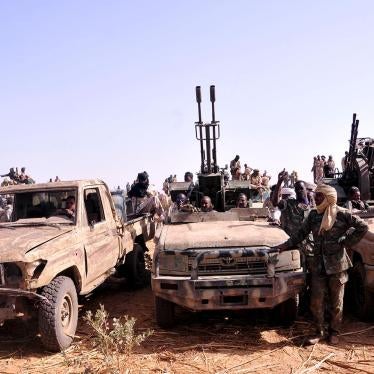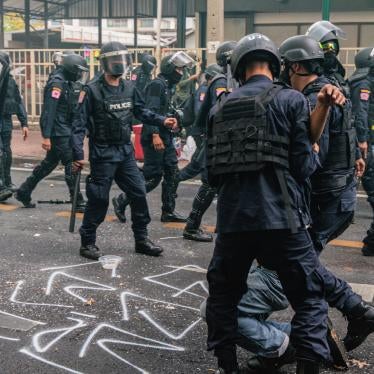(The Hague) – The International Criminal Court’s confirmation of 18 counts of war crimes and crimes against humanity charges against the warlord Bosco Ntaganda should pave the way for broader justice in war-torn eastern Democratic Republic of Congo, Human Rights Watch said today.
On June 9, 2014, three pre-trial judges unanimously found substantial grounds to believe that Ntaganda committed war crimes and crimes against humanity including murder and attempted murder, attacks against the civilian population, rape and sexual slavery, pillaging, and persecution in northeastern Congo’s Ituri district in 2002 and 2003. The ruling of the International Criminal Court (ICC) was based on evidence presented by the Office of the Prosecutor at a February hearing.
“The ICC decision sending Ntaganda to trial opens the door to justice for victims of horrific crimes in Ituri,” said Géraldine Mattioli-Zeltner, international justice advocacy director at Human Rights Watch. “Ntaganda’s upcoming trial will send a powerful message to those responsible for grave crimes in Congo that justice will eventually catch up with them.”
Ntaganda was implicated in serious abuses against civilians for over a decade, as he moved from one rebel group to another in eastern Congo. The abuses continued while he served as a Congolese army general between 2009 and 2012. In April 2012 Ntaganda mutinied from the army and helped to launch a new rebel group, the M23. Following infighting in the ranks of the M23 and a loss of support from his backers in neighboring Rwanda, Ntaganda surrendered voluntarily at the US embassy in Kigali, Rwanda in March 2013, and asked to be transferred to the ICC.
The full decision on the confirmation of charges can be appealed with pre-trial chamber authorization.
ICC judges will announce the start date of the trial in due course.
One other Congo case is pending before the ICC, of Sylvestre Mudacumura, the military commander of the Democratic Forces for the Liberation of Rwanda (Forces Démocratiques de Libération du Rwanda, FDLR), a largely Rwandan Hutu armed group, some of whose members participated in the 1994 genocide in Rwanda. The FDLR has been responsible for numerous abuses in eastern Congo, including ethnic massacres, rapes, and forced recruitment of children. Mudacumura is still at large in Congo and should immediately be arrested and transferred to the ICC, Human Rights Watch said.
Research by Human Rights Watch and other organizations has found that senior political and military officials in Congo, Rwanda, and Uganda provided important financial, military, and political support to abusive militias in Ituri and the Kivu provinces, fully aware that these militias were engaged in widespread violations of international law. To make a significant contribution to justice in Congo, the ICC prosecutor should go beyond rebel commanders and investigate the role of these high-level officials and officers in serious abuses by national armed forces and armed groups active in Congo, Human Rights Watch said.
The ICC prosecutor, who is conducting investigations in seven other country situations around the world, needs strong support from ICC member countries to obtain the necessary funding and cooperation to undertake further investigations in Congo.
Congolese officials should support the work of the ICC through national efforts to fight impunity for the most serious crimes. Those efforts should include moving forward with the government’s proposal to establish specialized mixed chambers to handle these cases within the Congolese judicial system, provided they are independent and effective.
“Justice will not be complete if those who backed and armed Congo’s abusive militias are left untouched,” Mattioli-Zeltner said. “Ntaganda’s trial should motivate the ICC prosecutor to take her investigation in Congo to the next level and go after the senior officials ultimately responsible for the region’s atrocities.”
Background
The Congo investigation at the ICC was opened in 2004 after the prosecutor received a referral from President Joseph Kabila. Congo has been an ICC member country since 2002. The Office of the Prosecutor initially focused its investigations in the Ituri district in northeastern Congo. The ICC issued arrest warrants against four rebel leaders in relation to crimes there: Ntaganda and Thomas Lubanga of the Union of Congolese Patriots (Union des Patriotes Congolais, UPC) and two leaders of the opposing armed groups, Mathieu Ngudjolo of the Nationalist and Integrationist Front (Front des nationalistes et intégrationnistes, FNI) and Germain Katanga of the Patriotic Resistance Front in Ituri (Front de Résistance Patriotique en Ituri, FRPI).
Lubanga was convicted in March 2012 and sentenced to 14 years in prison for recruiting and using child soldiers during the Ituri conflict in 2002 and 2003. Ngudjolo was acquitted in December 2012, and Katanga was convicted in March 2014 and sentenced to 12 years in prison for complicity in murders and an attack on civilians in the village of Bogoro, Ituri, in February 2003. All three judgments are under appeal.
In 2008, the ICC prosecutor opened investigations in North and South Kivu provinces of eastern Congo, which led to arrest warrants against two FDLR leaders. ICC judges declined to confirm the charges against one of them, the FDLR executive secretary, Callixte Mbarushimana, who was released in December 2010 from ICC custody. Mudacumura, who is still at large, is the other.
The ICC first issued an arrest warrant against Ntaganda in 2006, for the war crimes of recruiting and using child soldiers during the war in Ituri in 2002 and 2003. In July 2012, the ICC issued a second arrest warrant against Ntaganda, broadening the scope of charges to include other grave crimes during the same conflict. The expanded set of charges confirmed against Ntaganda is more representative of the range of grave crimes committed by the UPC in Ituri. It will mean that a broad number of the victims of UPC attacks – in addition to child soldiers – will finally have access to justice through Ntaganda’s trial, Human Rights Watch said.
From 2002 to 2005, Ntaganda had served as chief of military operations of the UPC. During that period, forces under Ntaganda’s command were implicated in many serious human rights abuses, including ethnic massacres, torture, rape, and recruitment of child soldiers.
After leaving the UPC in 2006, Ntaganda moved on to North Kivu province, where Human Rights Watch documented his continued involvement in grave abuses against civilians. He first joined a rebel group, the National Congress for the Defense of the People (Congrès National pour la Défense du Peuple, CNDP), but was made a general in the Congolese army in 2009 as a result of a peace agreement between the government and the CNDP and despite the pending ICC arrest warrant against him.
In April 2012, together with his supporters who had also been reintegrated into the army, he mutinied and helped create the M23, a new rebel movement. Human Rights Watch documented grave human rights violations by M23 fighters, including summary executions, rape, and forced recruitment of child soldiers. Like the UPC and the CNDP before, the M23 had support from Rwandan military officers.
None of the grave crimes committed in North Kivu by troops under Ntaganda’s control are included in the case against Ntaganda at the ICC. Victims of these crimes have expressed great disappointment that the ICC case against Ntaganda will not permit them the opportunity to have their suffering addressed. They have urged the ICC prosecutor to add additional charges to Ntaganda’s dossier to cover these crimes, but the prosecutor’s office said it does not have the necessary time and resources to do it at this time.
Ntaganda is the first accused to surrender voluntarily to the ICC. On March 18, 2013, he turned himself in at the United States embassy in Kigali, Rwanda and asked to be transferred to The Hague. Infighting between two factions of the M23 and the loss of support from his Rwandan backers may have led him to fear for his life.






